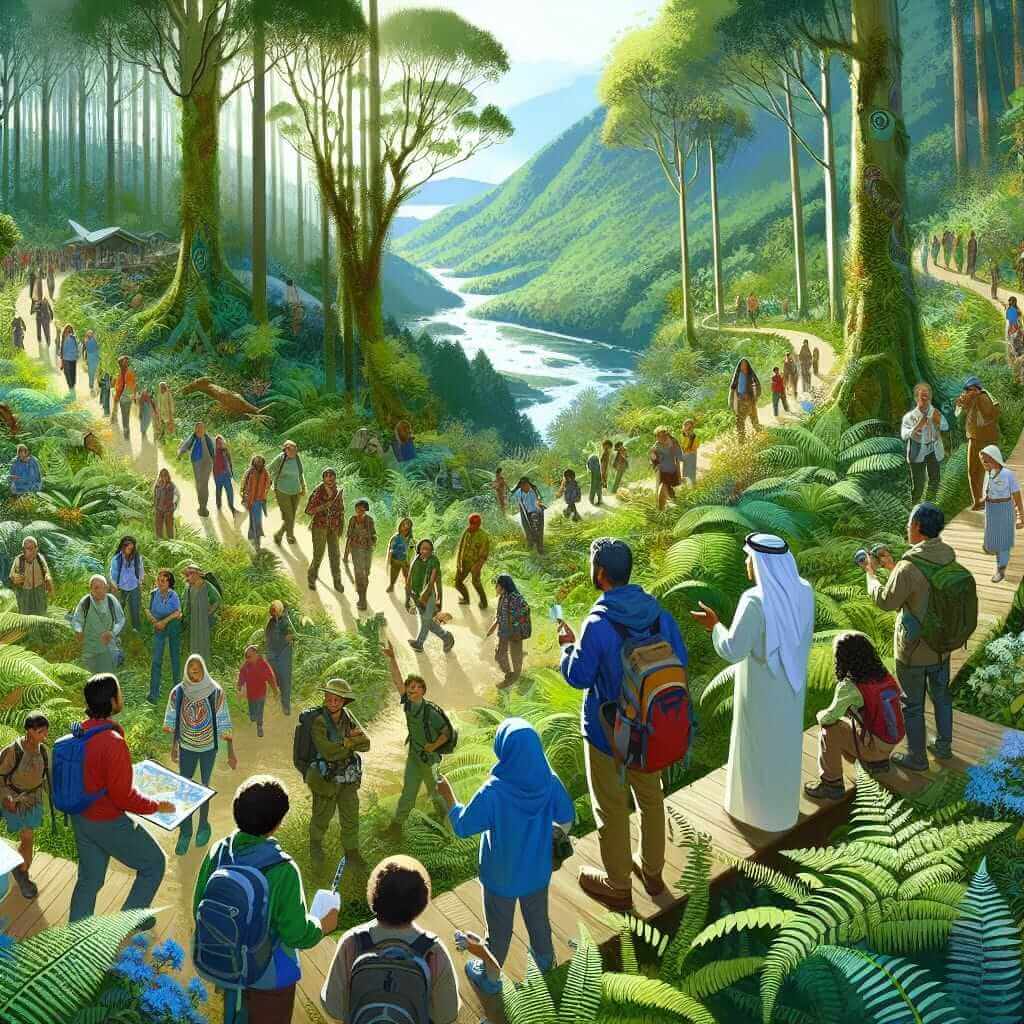The Reading section of the IELTS exam tests your ability to understand and interpret English texts on various subjects. One topic that is becoming increasingly prevalent is the impact of eco-tourism on traditional tourism industries. As global awareness of environmental issues rises, eco-tourism has grown in popularity, raising questions about its effects on traditional tourism. Historically, such themes have appeared frequently in IELTS Reading passages, indicating their relevance and importance.
Given current trends, it is highly likely that such topics may recur in future exams. This guide aims to provide a comprehensive practice reading passage on this topic, accompanied by relevant questions, detailed answers, and useful vocabulary and grammar tips.
Practice Reading Passage
Topic: How is the Rise of Eco-Tourism Influencing Traditional Tourism Industries?
Eco-tourism, defined as responsible travel to natural areas that conserve the environment, has seen a significant rise over the past decade. This shift in consumer behavior is influenced by increasing environmental awareness and a desire for sustainable travel. Traditional tourism, which often emphasizes convenience and comfort over sustainability, is facing challenges in this new eco-conscious environment.
One of the primary impacts of eco-tourism on traditional tourism industries is the change in tourist expectations. Modern tourists are seeking more authentic, nature-centric experiences rather than the mass-produced and frequently environmentally damaging options offered by conventional tourism. Destinations that were once popular for their luxury amenities and entertainment are now being overlooked in favor of those that offer eco-friendly practices and greater interaction with nature.
Moreover, eco-tourism often supports the local economy by utilizing local resources and employing local guides, whereas traditional tourism sometimes neglects such opportunities. By fostering deeper connections between travelers and the local environment, eco-tourism can contribute to the local community’s sustainability and prosperity.
However, this shift is not without its challenges. The infrastructure required to support eco-tourism can be costly, and the industry can struggle to balance the need to protect natural resources with the necessity of accommodating tourists. Traditional tourism operators are beginning to recognize these challenges and are gradually adapting by incorporating more sustainable practices into their operations.
In conclusion, the rise of eco-tourism is redefining the tourism landscape. Traditional tourism industries must evolve to meet the growing demand for sustainable travel options. While this transformation may be challenging, it represents an opportunity for the tourism industry to contribute positively to environmental conservation and the well-being of local communities.

Questions
Multiple Choice
-
What is one of the primary reasons for the rise in eco-tourism?
A) Desire for luxury
B) Increasing environmental awareness
C) Urban development
D) Convenience and comfort -
How does eco-tourism typically support the local economy?
A) By employing international guides
B) By using local resources and hiring local guides
C) By building luxury hotels
D) By promoting foreign investments
Identifying Information (True/False/Not Given)
- Eco-tourism prioritizes responsible travel that conserves the environment.
- Traditional tourism always supports local economies.
- The infrastructure required for eco-tourism is generally inexpensive.
Matching Information
-
Match the effects of eco-tourism on traditional tourism industries with the corresponding statements:
A) Change in tourist expectations
B) Economic benefits for locals
C) Infrastructure challengesi) Eco-tourism helps boost local communities’ economy.
ii) Tourists are now seeking more authentic experiences.
iii) High costs are involved in supporting eco-tourism infrastructure.
Summary Completion
- Eco-tourism is rising due to __. It often provides __ to local economies, unlike traditional tourism, which might overlook such opportunities. Challenges include the high cost of __ to support eco-tourism.
Answer Keys
Multiple Choice
-
B) Increasing environmental awareness
- Correct as eco-tourism’s rise is directly linked to environmental consciousness.
-
B) By using local resources and hiring local guides
- Correct as the passage explains how eco-tourism supports the local economy.
Identifying Information (True/False/Not Given)
-
True
- The passage defines eco-tourism as responsible travel that conserves the environment.
-
False
- Traditional tourism often overlooks local benefits as mentioned in the text.
-
False
- The passage explicitly states the high costs involved in eco-tourism infrastructure.
Matching Information
-
- A) ii) Tourists are now seeking more authentic experiences.
- B) i) Eco-tourism helps boost local communities’ economy.
- C) iii) High costs are involved in supporting eco-tourism infrastructure.
Summary Completion
- Eco-tourism is rising due to increasing environmental awareness. It often provides economic benefits to local economies, unlike traditional tourism, which might overlook such opportunities. Challenges include the high cost of infrastructure to support eco-tourism.
Lessons Learned
Common mistakes when approaching questions on such reading passages include:
- Not understanding the main idea of each paragraph.
- Misinterpreting factual details.
- Overlooking the nuanced differences between eco-tourism and traditional tourism.
Vocabulary
- Conserve (verb) /kənˈsɜːrv/: To protect something from harm or destruction.
- Sustainable (adjective) /səˈsteɪ.nə.bəl/: Capable of being maintained over the long term without harming the environment.
- Infrastructure (noun) /ˈɪnfrəˌstrʌktʃər/: The basic physical structures needed for the operation of a society or enterprise.
- Prosperity (noun) /prɒsˈper.ɪ.ti/: The state of being successful usually by making a lot of money.
Grammar
- Relative Clauses: “that conserves the environment” functions as a relative clause giving more information about “travel.”
- Example: Eco-tourism, which focuses on sustainability, is growing popular.
Advice
To excel in the Reading section of the IELTS exam:
- Practice reading different types of passages regularly.
- Improve vocabulary and practice synonyms as they help in answering paraphrased questions.
- Time management is critical; practice completing reading sections within the given time limit.
By following these techniques and engaging in consistent practice, you can significantly improve your reading skills and achieve a higher score on the IELTS exam. Good luck!